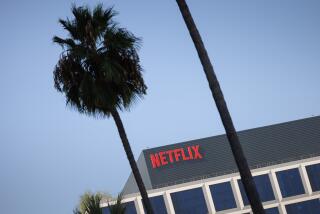Under pressure, Netflix pulls an episode of ‘Patriot Act’ in Saudi Arabia
Netflix has been on a global tear: spending billions of dollars on content a year to expand its reach in hundreds of countries amid slowing U.S. subscriber growth.
But as it pushes into countries with authoritarian regimes, the Los Gatos, Calif., company is learning that some of its edgy and progressive content doesn’t always sit well with local officials.
Netflix found itself in the cross hairs of an international controversy this week when it yanked an episode of comedy show “Patriot Act” in Saudi Arabia that contained references to the killing of Jamal Khashoggi.
Netflix said it made the decision to comply with local laws. But the action provoked sharp criticism from some groups that see it as a form of censorship and capitulation to an autocratic government.
“By bowing to the Saudi Arabian authorities’ demands, Netflix is in danger of facilitating the kingdom’s zero-tolerance policy on freedom of expression and assisting the authorities in denying people’s right to freely access information,” Amnesty International said in a statement on its website Wednesday.
Sarah Leah Whitson, executive director of advocacy group Human Rights Watch, said on Twitter: “Netflix’s claim to support artistic freedom means nothing if it bows to demands of government officials who believe in no freedom for their citizens — not artistic, not political, not comedic.”
Experts say that Netflix has to balance the creative aspirations of its talent with its fiduciary duties as a public company.
“Streaming media CEOs aren’t going to be the guardians of moral principles. They are the guardians of escalating share prices,” said Eric Schiffer, chief executive of Patriarch Equity, a private equity firm specializing in media and technology. “We’re in the early innings of how we navigate content that’s designed to hit certain audiences but is released to a global village.”
“Patriot Act” host Hasan Minhaj made the references in an episode of the series titled “Saudi Arabia,” in which the American comedian criticized the kingdom’s conflicting explanations of Khashoggi’s death.
“This is the most unbelievable cover story since Blake Shelton won Sexiest Man Alive,” Minhaj said in the show.
The comedian also made critical remarks about Crown Prince Mohammed bin Salman, saying in the episode that “now would be a good time to reassess our relationship with Saudi Arabia.”
Netflix pulled the “Patriot Act” episode after Saudi Arabia’s Communication and Information Technology Commission notified the company that the episode was in violation of the kingdom’s anti-cybercrime law.
“We strongly support artistic freedom worldwide and removed this episode only in Saudi Arabia after we had received a valid legal demand from the government — and to comply with local law,” a Netflix representative said in a statement.
The series went live globally in October and was available around the world, including Saudi Arabia, for about two months before the episode was pulled.
Khashoggi was killed Oct. 2 in the Saudi Consulate in Istanbul, Turkey. The Saudi citizen, who wrote columns for the Washington Post, was critical of Mohammed, often taking the prince to task over his domestic and foreign policies.
The Saudi government’s explanation of Khashoggi’s torture and death has been inconsistent. Although at first the kingdom denied any knowledge, it later said that his killing was the result of a rogue operation.
The Netflix incident further clouds Saudi Arabia’s efforts to promote itself as an entertainment destination. The kingdom has been easing its restrictions on entertainment in recent months, including signing a pact with AMC Theatres to open its first cinema.
This isn’t the first time that Netflix has pulled its content from a foreign country.
The streaming company has removed drug-themed content from its offerings in Singapore, which has strict laws regarding illegal substances. The shows and movies affected by the decision included “Disjointed,” “Cooking on High” and “The Legend of 420.”
Major Hollywood studios have long had to grapple with censors in China. Studios frequently cast Chinese actors in Hollywood films and avoid thorny subjects that might run afoul of regulators. Netflix, however, has not had to make such adjustments because it does not have access to China’s vast market.
For 2018, Netflix was expected to spend as much as $15 billion on original and licensed movies and TV shows, outpacing rivals such as HBO and Amazon.
Netflix has been funding its growth plans largely through debt. For the recent third quarter, the company reported that its long-term debt rose to $8.34 billion from $4.89 billion in the year-ago period.
Shares of Netflix broke the $400 mark for the first time in June but finished 2018 at $267.66. The stock price is still up about 36% for the year.
More to Read
Inside the business of entertainment
The Wide Shot brings you news, analysis and insights on everything from streaming wars to production — and what it all means for the future.
You may occasionally receive promotional content from the Los Angeles Times.







